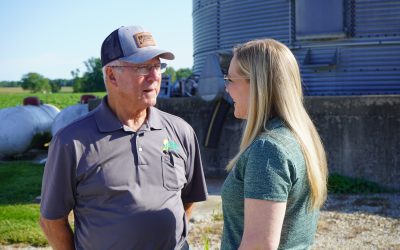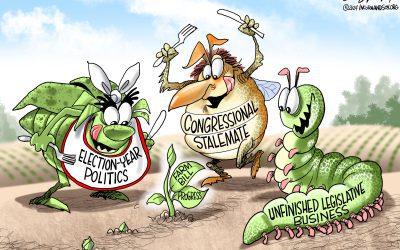New Year brings continued negotiations with Mexico over biotech corn imports


BY BROOKE APPLETON
Vice President of Public Policy, National Corn Growers Association
As we enter 2023, we are reminded that we are now less than one-year out from the effective date of the decree banning most corn imports from the United States into Mexico. The National Corn Growers Association (NCGA), along with state corn partners, ended 2022 sounding the alarm about this issue and we’re seeing results, though there is still work to do.
The current predicament emerged last year when President Andrés Manuel López Obrador promised to enact a decree that would ban all imports of biotech corn into Mexico, effective Jan. 31, 2024.
Since 90 percent of U.S. corn is biotech corn, and because Mexico is one of our top trading partners, the president’s promise threatened to upend a major economic partnership for our nation’s farmers. A study by World Perspectives showed that it also would adversely affect the Mexican economy and lead to issues of food insecurity. NCGA and state corn partners began an aggressive campaign to bring attention to the issue. We continue to call for the U.S. Trade Representative to file a complaint under the United States-Mexico-Canada Agreement (USMCA).
We are pressing the case through the media and through our champions on Capitol Hill. Several letters were fired off this winter from a bipartisan cadre of powerful House and Senate members calling for USTR to act.
State corn associations are working with their respective media outlets, pitching briefings to editorial boards at their state newspapers and working with their state’s legislative leadership to effect change. As a result, what started as a hard promise by President López Obrador to essentially end U.S. corn imports has begun to soften.
This is due in large part to the involvement of USDA Secretary Tom Vilsack, who listened to messages from our campaign, and he acted. He told the Mexican president first-hand that the United States would act if a reasonable agreement wasn’t reached.
President López Obrador has indicated that he would be open to allowing imports of yellow corn, used for animal feed, into the country but white corn, used for human consumption, might still face hurdles. He is also said to be considering a delay of the original implementation date.
As Secretary Vilsack and USTR Ambassador Katherine Tai met with President López Obrador in late December, NCGA made it clear that we would not accept a compromise that included banning corn, white, yellow or otherwise, and that we needed the impasse resolved quickly.
The negotiations are continuing, but NCGA is pleased to see that the conversation is headed in the right direction.
NCGA applauds Secretary Vilsack for his willingness to push for a dispute settlement under USMCA if an agreement is not reached.
The work on this effort is a great example of the type of advocacy that state corn associations and NCGA are
performing daily. Successes would not be possible if not for the reliable relationships that we’ve cultivated through the years with policymakers on both sides of the aisle.
NCGA will continue pressing forward on this issue, and we won’t stop until a fair deal is reached on behalf of America’s corn growers.
Next Generation Fuels Act
The Next Generation Fuels Act is a low-cost solution that would help diversify the nation’s fuel supply, improve vehicle engine efficiency, decarbonize transportation and give drivers affordable choices.
This bipartisan legislation would establish a clean, high-octane standard for gasoline and require that sources of additional octane result in at least 40 percent fewer emissions, allowing automakers to significantly improve vehicle fuel efficiency, all while supporting rural America. The Next Generation Fuels Act would also complement a federal clean fuel standard, supporting greater decarbonization of liquid fuels.
Consumer and Fuel Retailer Choice Act
Another key component to a bipartisan energy agenda is the Consumer and Fuel Retailer Choice Act. This legislation will ensure full market access for E15, often labeled as Unleaded 88 at the pump — supporting market certainty and affordable, low-carbon fuel options at the pump.
Last summer, drivers who chose E15 saved 16 cents per gallon on average. This legislation would not only open
the door to a staggering $20.6 billion in annual savings for consumers — it’s also an important step forward for a cleaner energy future. That’s why it’s supported by a broad coalition of more than 250 organizations and companies.
Renewable Fuel Standard
In the face of global uncertainty and rising climate threats, the Renewable Fuel Standard is just as relevant today than when it was first put in place almost two decades ago. Since then, the RFS has been a resounding success in expanding America’s fuel supply, lowering costs for drivers and reducing emissions. In fact, according to the Department of Energy’s Argonne Lab, today’s ethanol now results in up to 52 percent fewer greenhouse gas emissions than gasoline. America’s corn farmers are critical for the continued success of the RFS through higher corn yields and enhanced sustainability, and as the EPA begins a new phase of this program, there’s an opportunity to enable ethanol to contribute even more as a climate and energy solution.
Inflation Reduction Act implementation
Implementing the climate programs and tax credits of the Inflation Reduction Act – signed into law last year — are
imperative for clean energy innovation and security. These key biofuel provisions, if applied with an accurate lifecycle carbon assessment — including the benefits of sustainable aviation fuel and clean fuel production — will spur greater carbon emission reductions and rural economic growth.
NCGA submitted comments to USDA, Treasury, and the IRS to ensure corn farmers have a seat at the table when it comes to implementation of these important biofuel programs and tax credits and ultimately to expand the role of ethanol in reducing emissions and providing consumers with affordable fuel choices.
Posted: March 20, 2023
Category: ICGA, Indiana Corn and Soybean Post - Winter 2023



